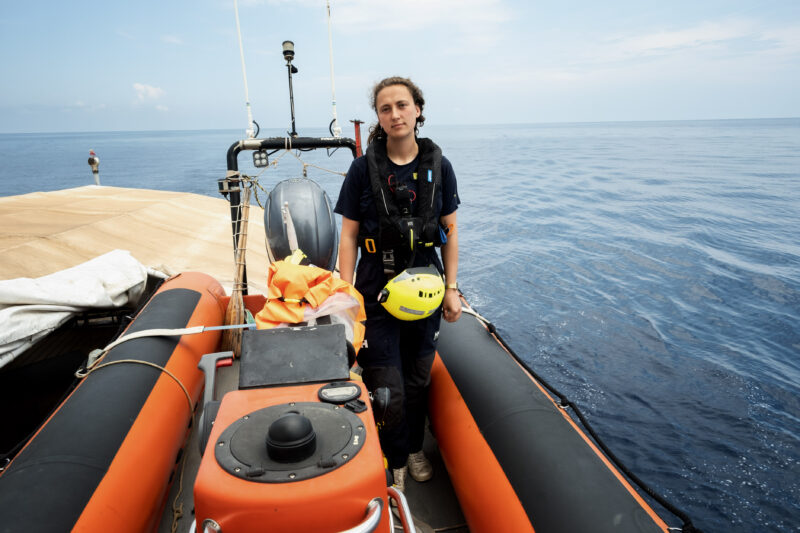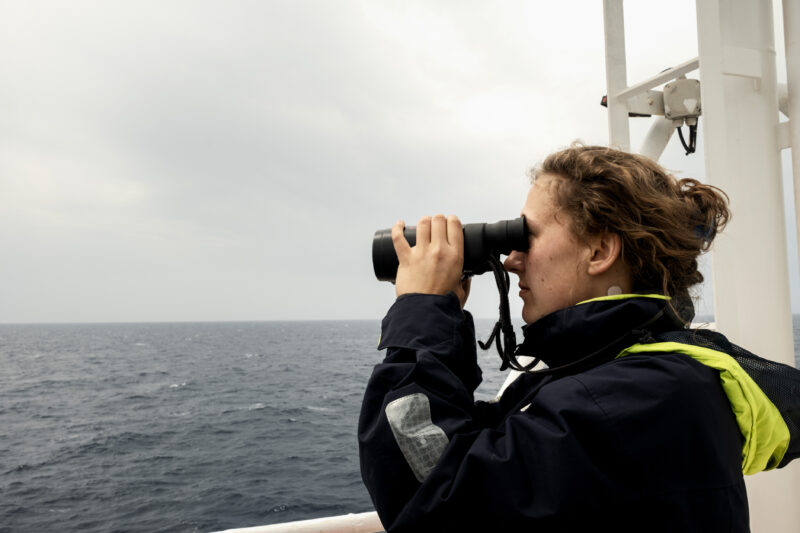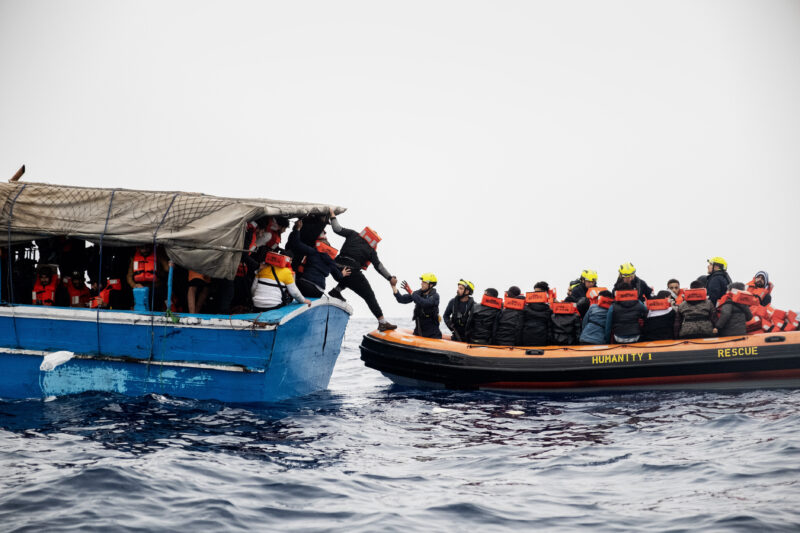Praying for fair winds: RHIB driver Lotte reports from board

I was on board the Humanity 1 in May 2023, working as one of the RHIB (Rigid Hull Inflatable Boat) drivers as part of the SAR (Search and Rescue) team. I have been involved in this field for 7 years, working in the Aegean and the Central Mediterranean.
We headed south from Sicily, towards the area of operation. We were informed of case of a wooden boat with approx. 100 people on board north of Benghazi, Libya, which would take us 3-4 days to reach. We were battling 4m waves on our journey there, praying that the boat in distress had fairer winds.

We were awoken around 5am, still dark outside. Quickly, everyone is getting prepared for the rescue to happen. The SAR team dresses in their gear, (made up waterproofs, helmet, and a lifejacket) and organises their equipment, until we are ready to launch the RHIBS. This was an apprehensive time for the crew, unsure of what the situation we are about to encounter will be, but also a sense of great relief that we were finally on scene after many hours. Once on the water, we approached the boat, and the cultural mediator made the first contact, saying who we are, for them to remain calm. ‘No more Libya’, these three words can calm a crowd and can enable important trust incredibly quickly. The boat looked like an old wooden fishing boat, crowded with 88 people on board. Not a single one wearing a lifejacket. The sun was coming up now, and the rescue was completed within an hour, each RHIB taking turns to shuttle survivors to the mothership.
People explained that they had been at sea for around 2 days. They reported to us that another boat had departed the coast of Libya with them, but after the first 24 hours they had lost sight. Once on board, the survivors said ‘we will wait’ wanting us to know that they would wait for however long it took for us to continue the search to find this other boat. A boat of people that they did not know, but knew were in the same situation as them, but sadly had a very different outcome. Later we heard reports that they had been intercepted and returned to Libya by the so-called Libyan coastguard. People making the treacherous crossing from the coasts of Libya or Tunisia are subjected to severe human rights abuses. They are subject to torture, sexual violence, arbitrary detention and much more. It struck me as such a vivid contrast, the people on board who had just gone through such terror, back in Libya, and then the crossing, showing such humanity to fellow people, compared to that of the politicians in Europe so severely lacking humanity with their cruel policies.

During the rescue, I believe you are seeing people at their most vulnerable. It is a high stress, emotional time where your full concentration is needed. You can be expected to make split-second decisions, and always try to remain calm. The second rescue, the boat had been at sea for 3 days. It was one of the smallest unseaworthy vessels that I had come across packed full with around 30 people, including a young baby.

When we took half the people on board our RHIB to transfer them, I had a young man wearing a hat sit next to me. He tipped his hat as a thank you, with a big smile across his face. That moment will stay with me for a long time. The sheer relief and gratitude after facing such fear.
It took 3-4 days sailing north again up towards Livorno, our designated port of safety for the disembarkation. Another cruel practice by Italy, to send NGO ships far north, trying to prolong the time a rescue ship is out of the search and rescue area for.
Once the people had rested, a colleague and myself decided to get together a sport session. It was a magical moment. A time where people came together, and some others watched, as we did push ups, skipping, and star jumps (which many people found humourous). It felt like a moment of some form of normality for many, a time where they could work on themselves, to have autonomy over their body again, allowing the space for individuals to focus on their physical being rather than the fear of safety. People were joyfully competitive with one another, encouraging each other. We were even doing pull ups on one of the long beams that hang over one of the ship decks, I was very happy that they seemed impressed with my poor attempt at a single push up!

The evenings felt like a very peaceful time. During the food distribution, a survivor who was turned into the resident DJ during mealtimes would always put on Eritrean bands for people to dance to. It felt very joyous, watching people come together and dance, or trying to teach us their rhythms. The sun would slowly set after dinner, with some playing cards, others chatting, and others sitting and watching the sea.
I also had one of my deck watches from 03:00-06:00am which was a lovely time after you got used to the little sleep. It was a lovely moment, you would have the sunrise coming up, and slowly in the morning people would wake up, take a tea and join you sitting on a stool, we’d greet each other good morning, and there would be a beautiful moment, without sharing many words, but a peaceful moment shared together.
A happy moment, as you know that this is what so many people have put themselves in such danger to arrive here. But somehow also apprehensive because you know the hardships that they will continue to face. I hope to think that the time on the ship, be it only for few days, we managed to provide a space and time of complete mutual respect, of care, and kindness before they go on to their next part of the journey.
It feels like a privilege working in this field, surrounded by people that believe in humanity, and that will fight continuously for it.


